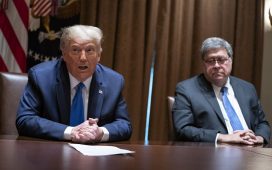With help from Tanya Snyder
Editor’s Note: This edition of Morning Transportation is published weekdays at 10 a.m. POLITICO Pro Transportation subscribers hold exclusive early access to the newsletter each morning at 6 a.m. Learn more about POLITICO Pro’s comprehensive policy intelligence coverage, policy tools and services, at politicopro.com.
— A stopgap spending bill likely to work its way through Congress and signed into law this week would save states from losing billions in highway funds next year.
— A top DOT official failed to disclose campaign contributions — including to his now-boss’ husband, Mitch McConnell — during his confirmation process.
— The safety of Uber’s self-driving program will be under scrutiny today as the NTSB discusses a 2018 crash that killed a woman in Arizona.
IT’S TUESDAY: Thanks for tuning in to POLITICO’s Morning Transportation, your daily tipsheet on all things trains, planes, automobiles and ports. Get in touch with tips, feedback or song lyric suggestions at smintz@politico.com or @samjmintz.
LISTEN HERE: Follow MT’s playlist on Spotify. What better way to start your day than with songs (picked by us and readers) about roads, rails, rivers and runways.
RESCISSION, FIXED? The continuing resolution, H.R. 3055 (116), introduced in the House to keep government funded through December has an important provision for state transportation departments: It would repeal a $7.6 billion rescission that was included in the 2015 FAST Act, a move that transportation groups and state officials have been calling for with increasing urgency in the last few months.
Barring any surprises, it looks like there’s a good chance the repeal will be law as soon as this week. The current stopgap funding bill runs out on Thursday, and congressional leaders in both parties and the White House have signaled they’re keen to avoid another shutdown. With the House-introduced CR as a way forward, and bipartisan support for the rescission repeal, states might be able to breathe easier by the weekend. The rescission was set to take place on July 1, 2020. Get more details from our Tanya Snyder.
DOT OFFICIAL FAILED TO DISCLOSE CAMPAIGN CONTRIBUTIONS: Joel Szabat, the acting undersecretary for policy at DOT, failed to disclose campaign contributions during his confirmation process, Tanya scooped on Monday. They included maxing out to McConnell, who’s married to Szabat’s boss, Transportation Secretary Elaine Chao. He also donated to Rep. Judy Chu and former Sen. John McCain, none of which were reported to the Senate Commerce Committee on a disclosure form asking about donations of $500 or more.
DOT’s response: Szabat updated his questionnaire on the committee’s website Monday afternoon with a letter apologizing for the oversight. “I have the utmost respect for the role of this Committee and of Congress in confirming Presidential nominees and have taken immediate action to correct this oversight,” Szabat said in the letter.
SWITCHAROO: Anne Reinke is the new deputy assistant secretary for congressional affairs at DOT, replacing Anthony Bedell, who left the agency last week, Tanya reports. Reinke, a former lobbyist for freight rail giant CSX, came to the agency in April as deputy assistant secretary for intergovernmental affairs. Sean Poole will take on Reinke’s portfolio within intergovernmental affairs but with the title of director, according to a department spokesperson.
REST IN PEACE: Shirley Ybarra, a transportation economist who served in several top federal and state positions, died earlier this month. Ybarra was a senior advisor to Transportation Secretary Elizabeth Dole in the 1980s and served as Virginia’s secretary of transportation. Most recently, she led the DOT transition team at the start of the Trump administration and was a senior transportation policy analyst at the Reason Foundation. “Her appreciation for harnessing the power of markets to steer public-purpose transportation investment and management has made our country a better place and she will be greatly missed by many,” writes Marc Scribner of the Competitive Enterprise Institute.
AN NTSB DAY OF RECKONING FOR UBER: Uber’s self-driving division could be facing a rough day today, as NTSB investigators meet to determine the probable cause of the fatal crash involving a self-driving Uber. Documents released by the federal safety agency earlier this month suggest the safety of the company’s cars at the time could be at least partially implicated. The Verge has a thorough breakdown of what we know so far, including that the “software installed in Uber’s vehicles that helps it detect and classify other objects ‘did not include a consideration for jaywalking pedestrians.’” Uber also told NTSB that it had 37 other crashes and incidents involving self-driving cars before the fatal crash, although in only two of them was the car the “striking vehicle.”
Uber said in a statement to The Verge that it’s made “critical program improvements” since the crash and looks forward to reviewing NTSB recommendations.
Making matters worse: Automotive News also broke Monday that Uber had developed, and then disabled, a system called Reflex, a supposedly “failsafe” emergency-braking system. Some in Uber’s self-driving division worried it “triggered too many braking events at a time when the program was under pressure to show progress in developing software,” Automotive News reported.
CALIFORNIA VS. CARMAKERS: About half of California’s fleet of state vehicles are made by the Trump-aligned manufacturers that state agencies will boycott under a new order announced Friday, POLITICO’s Debra Kahn reports from the Golden State. The context: “Newsom announced late Friday that the state will only buy vehicles from automakers that recognize California’s authority to set greenhouse gas and zero-emission vehicle standards. The move would benefit Ford, Volkswagen, BMW and Honda, which in July sided with California’s plan to increase fuel economy standards faster than the White House’s proposed rules,” Debra writes.
The numbers: The state owns about 14,000 Fords, 8,800 Chevrolets, 3,900 Dodges, 2,100 Ram trucks and 1,250 Toyotas. It only owns 300 Hondas and two Volkswagens.
ANOTHER BOARD MEETING TODAY: NTSB will also announce the probable cause of the 2018 engine failure on a Southwest Airlines flight that led to the first fatality on a U.S. airline in nearly a decade. The investigation has focused on metal fatigue on the CFM International engine.
MAILBAG: High-ranking Republicans on the House Transportation Committee wrote to the FAA on Monday asking for updates on its implementation of several provisions related to aviation safety inspectors from the reauthorization bill enacted last year, which they said are relevant to the ongoing investigations into the Boeing 737 MAX. “In particular, we need to know where the FAA is in its assessment of its safety inspector workforce and training needs, and its process for updating its strategy for ensuring robust, risk-based oversight of the aviation system,” said Reps. Sam Graves and Garret Graves in a statement.
It’s one of several actions the committee’s Republicans have taken on their own recently, after a few months of quiet in which T&I’s majority Democrats, at least publicly, took the lead.
THE MAYOR AND THE MAX: The mayor of Broward County, Fla, wants to stop the MAX from operating at Fort Lauderdale-Hollywood International Airport, according to the local NBC affiliate. Mark Bogen told NBC 6 that he’s planning to contact Boeing with a specific list of repairs he wants, including a way for pilots to turn off the MCAS flight control system that’s been implicated in the two crashes. “If they don’t, I am going to go to my commissioners. I am going to go to others mayors, as well, of other cities and seek to ban that plane from landing at Ft. Lauderdale Airport,” Bogen said.
He can’t do that, can he? Nope. As the article notes, the decision about where and when the MAX can fly is up to the FAA. And in fact, an agency spokesperson told NBC that if the county or the airport tried to restrict operations of the MAX that had been deemed safe by the FAA, it would be a violation of federal law.
— “Can a ‘smart helmet’ prevent bike crashes? Is it worth $200 to find out?” Washington Post.
— “Auto union now turns focus to Fiat Chrysler; strike possible.” Associated Press.
— “Parts with passports: how free trade drives GM’s engines.” Reuters.
— “Airbus books $14 billion deal with Air Arabia.” Wall Street Journal.
— “FedEx CEO challenges NYT publisher to public debate after tax story.” Reuters.
— “For the Eurostar tribe, Brexit could make Brussels feel even farther away.” New York Times.
DOT appropriations run out in 3 days. The FAA reauthorization expires in 1,412 days. Highway and transit policy is up for renewal in 317 days.








